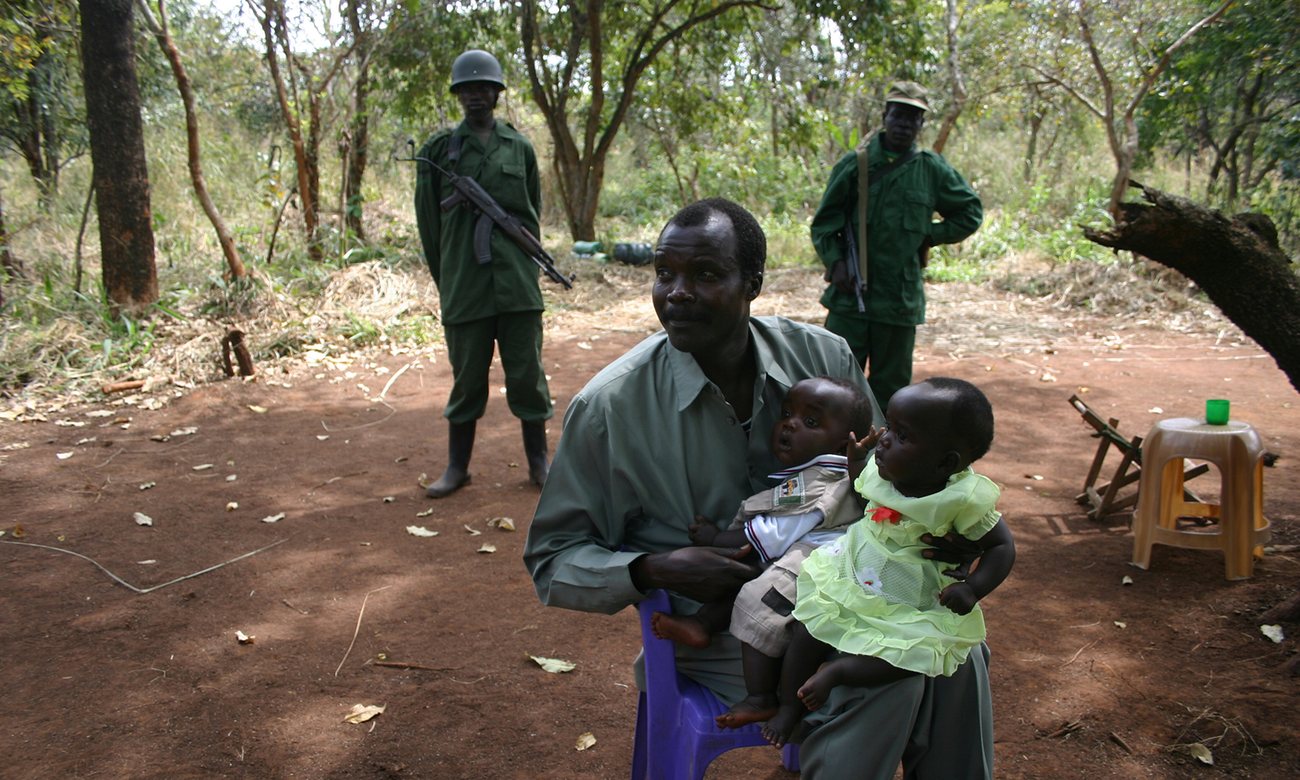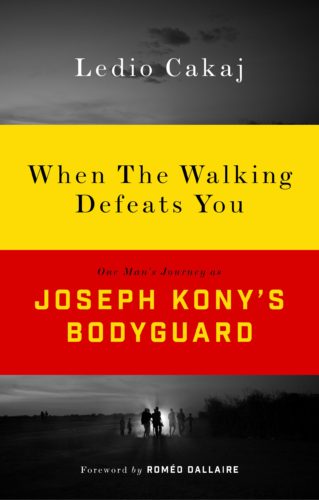PBS: Escaping Eritrea … [Read More...] about ካብ ውሽጢ ቤት ማእሰርታት ኤርትራ
Ledio Cakaj |
"We don't take sides; we help you see more sides."

Published:
PBS: Escaping Eritrea … [Read More...] about ካብ ውሽጢ ቤት ማእሰርታት ኤርትራ
Ledio Cakaj |

This extract is based on the testimony of George Omona, bodyguard to Joseph Kony during three years with the Lord’s Resistance Army (LRA), as told to Ledio Cakaj. In a foreword to the book, Cakaj says: “George opened up about some of the brutality he had experienced, as well as some he had carried out. I believe there is a lot more he has kept to himself, partly because of shame I imagine, but mostly because of fear.”
At the end of 2008, the LRA was forced out of Garamba national park in the Democratic Republic of the Congo (DRC), and by May 2009 Kony had decided to move, with his family and personal security unit, to Central African Republic (CAR).
Kony divided the 800 men, women and children bound for CAR into four groups. Sam’s group, which included George, travelled with Kony, often doubling as his security. George was happy to stay in Sam’s unit but the walk was as terrible as ever. Perpetually tired, sore, hungry and thirsty, he thought of nothing but rest, food and water. The only distraction from the hunger was the intense ache of his shoulders sagging under the heavy weight of the goods he carried.
He was genuinely worried about staying alive as people around him dropped like flies. It was even worse for Congolese civilians, who were killed each time the fighters came across them during the journey. The usual excuse was that the Congolese could inform the army of the LRA’s whereabouts if left alive, but George thought that it really made little difference what the Congolese would do if set free. Everyone in his group was too focused on their own survival to contemplate anything but walking and finding food and water. Killing seemed normal, another act in the struggle to stay alive.
It had been 10 days since the group started walking to CAR, and for the past 48 hours there had been no water in sight. Some women and children fainted from dehydration, and beatings by the guards did not revive them. People’s faces were dry and painfully wrinkled. Kony finally gave orders for all to stop and sent out water patrols. George was part of one of the patrols and he headed west with a group of 12 armed men and 10 abductees carrying empty containers the Acholis call jerekan. After a few hours’ walk the group heard the welcome sound of a stream nearby.
Approaching the river, George heard what he thought were human voices and motioned to the patrol to stop. Together with the armed fighters he slowly approached the stream, where he saw four Congolese men fishing with long spears and nets. The holies [how the LRA fighters referred to themselves] jumped out of the bush and caught the fishermen, who were terrified at the sight of the strange armed men. Without talking, one of the holies made a sign to the 10 abductees to kill the fishermen. The abductees, who wielded machetes and sticks, bludgeoned the fishermen to death while George and the rest of the armed fighters drank water. George kept drinking, stopping only to breathe and stare at the bodies of the fishermen that twitched as life left them. The water tasted really good.
George said a quick prayer after the abductees drank and then filled their containers. “Thank you God for allowing us to find this water,” he said, as everyone kneeled in prayer next to the battered bodies of the Congolese. After filling the jerry cans, the group quickly returned to the main position where the rest of the people waited. When news of the group’s return with water spread, everyone started to run in the direction of the stream; “Like bush pigs,” George thought.
After people had filled their water containers the group resumed walking. A few days later they came across some large swamps. Walking across the muddy land was tough. People kept getting stuck in the sludge, their gumboots providing little protection. The combination of wetland and mosquitoes made people’s feet sore and covered in blisters. Once on the other side of the swamp, Kony ordered a herb to be collected in the forest which his wives mixed with some secret ingredient, making a concoction that the holies were told to smear on their sore feet.
George put some of the mixture on his feet and felt better. He was impressed with Kony’s knowledge of plants and remedies. Many believed Kony could even cure Aids. Kony said that it was Lakwena, the Holy Spirit, who had told him the secrets of the medicinal plants. He also said that Lakwena would periodically instruct him to forbid the consumption of certain foods like cows, pigs, honey or yams. Those who disobeyed such orders and were caught faced the ultimate penalty of 500 strokes of the cane, which meant certain death.
No one had survived 500 strokes but at the end of April, during the walk to CAR, one woman came close. As the group approached the border, people had woken up to realise that a woman was missing. Usually night camps were overseen by guards keeping watch to ensure no one escaped. But given the levels of exhaustion, it was no surprise the night guards had fallen asleep or were far from alert. Many thought the woman was probably hiding nearby, too tired to walk, waiting for the group to leave. Every escape attempt was treated seriously, particularly if it occurred in Kony’s group, as he regarded defections as personal affronts. A number of armed men combed the area around the camp. Kony had already started walking early that morning – he never waited for anybody – and the other commanders called off the search soon after, wanting to catch up with the general. Kony set a terrifying pace when marching and was nearly impossible to catch once he had gone too far ahead.
As the fighters returned, a young girl screamed from inside the forest. It was another abductee who had gone to urinate when she felt someone grabbing her from behind the bush where she had squatted. The missing woman tried to make her stop yelling, begging her not to tell, but the terrified girl had already given her up. Fighters ran toward the two and dragged the woman in front of Otto Agweng, the chief security officer. What he lacked in physical stature, Agweng made up in brute force. With the exception of a few senior commanders, everyone feared Agweng and his penchant for ordering terrible beatings for the smallest of infractions.
Agweng questioned her for a while. She answered in broken Luo that she had wanted to escape as she was too tired to continue walking and feared she would die of exhaustion. She shook and asked for mercy, promising that she would never again try to leave. Her body was swollen from beatings by the men who first caught her and her hair and clothes were dusty from being dragged by her feet in front of Agweng. He said he would not kill her because she was just a stupid woman and ordered she be beaten. Four hundred strokes on her back, bottom and thighs. If she were to make a sound she would be shot. A fighter holding a loaded gun stood over her as two others beat her with sticks.
George witnessed how she absorbed the beating without crying or touching her back, a violent spectacle, the likes of which he had rarely witnessed before. He did not know whether it was the level of brutality or her ability to withstand it without making a sound that made such an impression, but he was uncomfortable and angry. “It is one thing to make a mistake and pay for it,” he thought, “but these experiences scar the heart and soul as well as the body.”
After the 400 lashes were administered the woman could not lift herself off the ground. George helped her stand and walked her to the stream. She crawled into the water and washed herself. A few minutes later she walked slowly to the place she had spent the night, gathered her belongings and loaded up everything on her head. She walked at the back of the group, often falling to the ground but always getting up to continue walking. George was certain she would die from her wounds but she did not. Later that day she managed to keep pace with the group, walking in complete silence. Her resolve impressed the holies, who spoke about it for days. Ever since, the place where she was beaten was known to all as oddo miyangweny, the Luo term for 400 lashes.